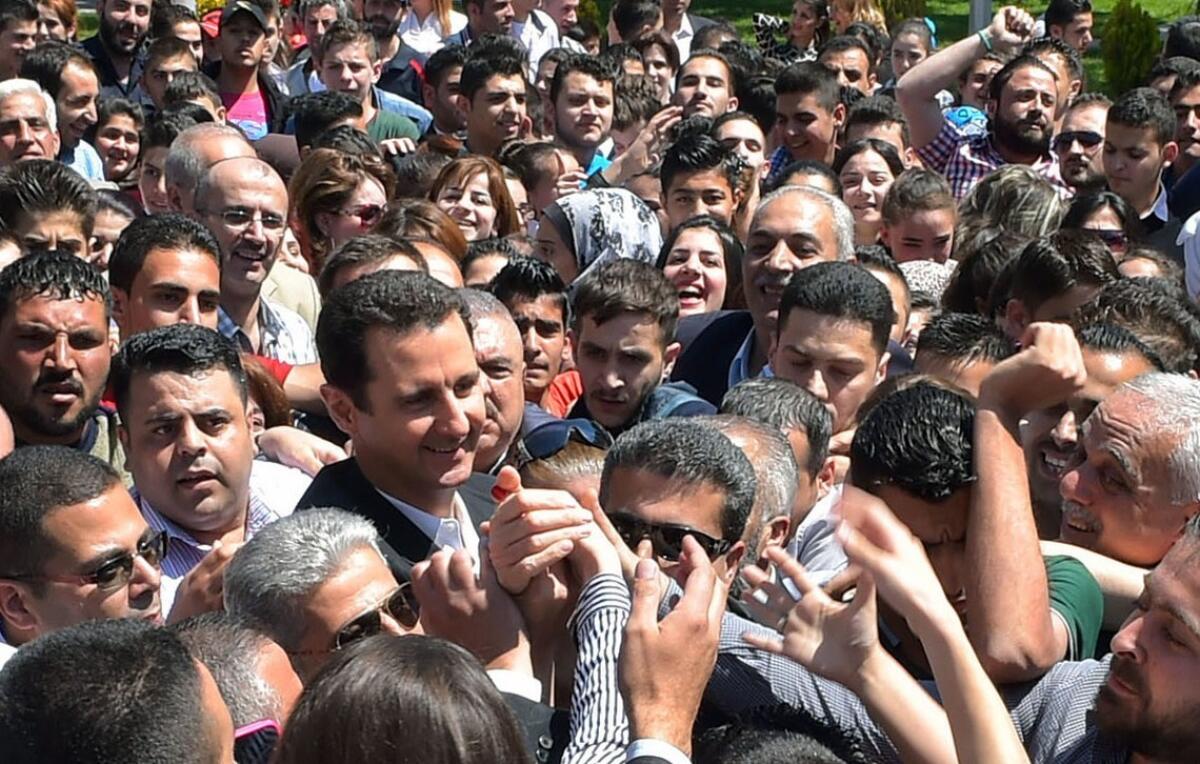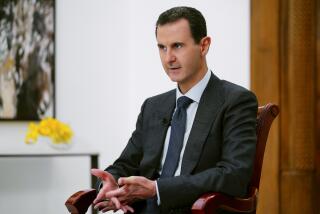Syria’s Assad says he’s ‘not worried’ despite battlefield setbacks

President
Reporting from Istanbul, Turkey — Syrian President Bashar Assad said Wednesday he was “not worried” about battlefield setbacks and exhorted supporters to avoid succumbing to “frustration” as the Syrian conflict rages on without an end in sight.
“In wars, there are wins and losses,” Assad said, while not explicitly conceding any recent rebel victories.
“But this doesn’t prevent us from warning people that the beginning of frustration leads to defeat,” the Syrian president declared at a ceremony in Damascus marking Martyrs Day, a national holiday.
The comments reported in the state-run media were Assad’s first public declarations since Al Qaeda-linked rebels in March and April seized a number of towns in Syria’s northwest, including the provincial capital of Idlib and the strategic town of Jisr al-Shughur.
The remarks seemed designed to reassure supporters at a difficult moment. Despite Assad’s confident tone, the comments indicate some degree of concern within ruling circles in Damascus and a need to bolster public confidence.
In his address, Assad noted that a war could involve “thousands of battles,” with many “wins and losses, and ups and downs, but the important thing is for faith in the inevitability of victory to remain unchanging.”
The recent opposition gains have triggered international media speculation that Assad’s government may be wavering after more than four years of war. The overstretched Syrian army is fighting on multiple fronts and has suffered heavy losses, though the government maintains firm control of the capital, the Mediterranean coast and major cities such as Homs and Hama.
Opposition forces -- including the Al Qaeda-affiliated Nusra Front and Islamic State, the Al Qaeda breakaway faction -- also hold large stretches of Syria.
Recent reports have indicated that Islamist rebel factions, including Nusra Front, have regrouped and received renewed financial and military aid from outside allies, including Saudi Arabia, Turkey and Qatar. The three nations have been major supporters of the armed effort to oust Assad.
But the Syrian president dismissed conjecture about his government faltering as part of an orchestrated “propaganda campaign” meant to stir doubts among the population. Similar reports that his leadership was nearing collapse after the war erupted in 2011 proved to be illusory, Assad noted, citing an even more tenuous period for his rule.
“I’m not worried over this, because as the first propaganda campaign ... at the beginning of the crisis failed, this campaign will fail,” said Assad in his comments at a school honoring “martyrs” lost in the current conflict.
He also vowed that Syrian forces would rescue pro-government forces trapped in a hospital in the northern town of Jisr al-Shughur, now in rebel hands.
The comments appeared aimed largely at Assad’s core backers, including minorities, business leaders, security personnel and others who have remained loyal through the punishing war that has left more than 200,000 dead, destroyed large swaths of the country and forced millions to flee Syria. Many supporters fear that an overthrow of Assad’s secular government would result in sectarian cleansing and a hard-core Islamist regime in Damascus.
Opposition representatives who routinely label Assad as delusional dismissed his latest comments as indicative of his lack of a grasp of the mounting military losses, economic setbacks and popular discontent undermining his rule.
“Assad is completely out of touch with reality,” said George Sabra, a exiled opposition figure contacted by telephone in France. “Either he does not know the reality, or he truly is out of the picture. ... He is not ruling the country, but is merely imprisoned in it.”
Assad’s speech comes a day after a key ally, Hassan Nasrallah, who heads Lebanon-based Hezbollah, also labeled as “futile” and “baseless” a “wave of rumors” suggesting that Assad’s rule was foundering.
Nasrallah vowed that Hezbollah and its patron, Iran, would stand by the Syrian government despite the “psychological war” against Syria. Military and financial aid from Hezbollah and Iran have been crucial in maintaining Assad’s rule in Syria.
“The Syrian state and army are strong and they can change the course of the battle,” Nasrallah declared Tuesday.
Special correspondent Nabih Bulos in Istanbul contributed to this article.
More to Read
Sign up for Essential California
The most important California stories and recommendations in your inbox every morning.
You may occasionally receive promotional content from the Los Angeles Times.








